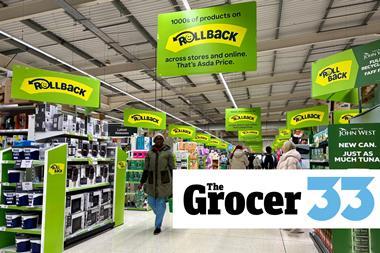Retailers are still losing millions through a failure to get to grips with instore logistics and inaccurate book stock, Christian Salvesen’s UK MD has claimed.
Brian Gaunt, who was supply chain boss at Asda and Big Food Group before joining the logistics company, said retailers spending a fortune on collaborative planning, forecasting and replenishment technology were merely “tinkering at the edges” of the on-shelf availability issue.
Poor backroom discipline and stock balance maintenance were still the primary cause of out of stocks, he insisted.
“Backstore warehouses are a significantly more complex environment to work in than regional distribution centres, yet staff are paid less than two-thirds of what they’d make in a warehouse,” he said.
They are also dealing with a much larger range, often of single items, without any
warehouse systems to help them locate product, he said.
“Deliveries arrive every 20 minutes and during peak times the backroom and yard are stretched to capacity. It’s a recipe for disaster.”
Book stock is still being corrupted, which in turn generates inaccurate store orders, he added. “Every time the wrong item is picked from a distribution centre - and I’d say mis-picking usually runs at about 1% - it creates two stock imbalances in store. You’ve got one item that you didn’t order and you’re still missing the one that you did.”
Likewise, when customers go to a checkout and a barcode doesn’t scan, a ‘dump code’ is often generated so that the item can go through the till, he said. However, the stock balance is not updated, so on paper, the product appears to be in stock.
Similarly, if a customer has seven flavours of the same brand of cat food, checkout assistants frequently scan one tin and multiply it by seven. Although this speeds up the checkout process, it corrupts the stock system, which believes seven tins of rabbit flavour have been sold instead of one.
“Retailers need to admit and take ownership of the problem by investing in people and warehouse systems, or outsource this function to the third-party logistics companies,” Gaunt said.
Elaine Watson
Brian Gaunt, who was supply chain boss at Asda and Big Food Group before joining the logistics company, said retailers spending a fortune on collaborative planning, forecasting and replenishment technology were merely “tinkering at the edges” of the on-shelf availability issue.
Poor backroom discipline and stock balance maintenance were still the primary cause of out of stocks, he insisted.
“Backstore warehouses are a significantly more complex environment to work in than regional distribution centres, yet staff are paid less than two-thirds of what they’d make in a warehouse,” he said.
They are also dealing with a much larger range, often of single items, without any
warehouse systems to help them locate product, he said.
“Deliveries arrive every 20 minutes and during peak times the backroom and yard are stretched to capacity. It’s a recipe for disaster.”
Book stock is still being corrupted, which in turn generates inaccurate store orders, he added. “Every time the wrong item is picked from a distribution centre - and I’d say mis-picking usually runs at about 1% - it creates two stock imbalances in store. You’ve got one item that you didn’t order and you’re still missing the one that you did.”
Likewise, when customers go to a checkout and a barcode doesn’t scan, a ‘dump code’ is often generated so that the item can go through the till, he said. However, the stock balance is not updated, so on paper, the product appears to be in stock.
Similarly, if a customer has seven flavours of the same brand of cat food, checkout assistants frequently scan one tin and multiply it by seven. Although this speeds up the checkout process, it corrupts the stock system, which believes seven tins of rabbit flavour have been sold instead of one.
“Retailers need to admit and take ownership of the problem by investing in people and warehouse systems, or outsource this function to the third-party logistics companies,” Gaunt said.
Elaine Watson

















No comments yet